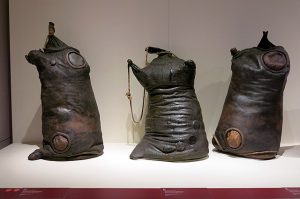“No one sews a piece of unshrunk cloth on an old cloak; otherwise, the patch pulls away from it, the new from the old, and a worse tear is made. Similarly, no one puts new wine into old wineskins; otherwise, the wine will burst the skins, and the wine is lost, and so are the skins, but one puts new wine into fresh wineskins.” – Mark 2:21–22
It’s kind of surprising to hear Jesus say categorically, “No one does thus and such.” It’s an “everyone knows” statement; he’s basically saying “this is obvious.” And then he tells us two basic things, two pieces of household wisdom, as if everything he is saying is simple and straightforward. And while this passage sounds simple, it turned out to be one of the trickiest Bible passages I’ve studied in a while. In order to begin to understand what is at stake in this passage, I had to spend as much time unpacking my own cultural assumptions as I did unpacking the Scripture.
A Culture of Replacement, a Culture of Repair
In this passage, Jesus speaks in two short parables, and he’s talking about “stuff”: patches and old cloaks, new wine and old wineskins. Jesus speaks about objects that were common then: cloaks, patches, wineskins and still fermenting wine. Most of those things, except maybe the patches, aren’t really part of our lives here and now. In our modern lives, furnished with machines and mass production, when faced with wear or breakage, most of us often turn to replacement rather than repair. Most of us are not spending the kind of time growing and spinning and weaving that people would have spent in Jesus’ time, and most of us would rather not spend time mending our damaged items. It’s a pain, it takes time, the item might not look the same, and new and fresh items can be kind of fun, anyway.
 In that time, though, and in that kind of economy, if you had a garment in need of mending, you would mend it—and you would choose the appropriate fabric to do so. The new, unshrunk cloth would shrink at the first washing and so would pucker and pull and potentially damage the (already shrunk) older cloth of the original garment. You would be better off choosing old cloth than new cloth for your repair.
In that time, though, and in that kind of economy, if you had a garment in need of mending, you would mend it—and you would choose the appropriate fabric to do so. The new, unshrunk cloth would shrink at the first washing and so would pucker and pull and potentially damage the (already shrunk) older cloth of the original garment. You would be better off choosing old cloth than new cloth for your repair.
But if new cloth was all you had, you could process it to fix that problem: you could wash the new fabric, maybe rub or pound or agitate it (I know way too much about fiber behavior after several years of knitting) but again, you would still do that, you would still do the mending, because the garment needed to be fixed. This is something “everyone knew” at the time the parable was told.
So when Jesus says, “No one sews a piece of unshrunk cloth on an old cloak; otherwise, the patch pulls away from it, the new from the old, and a worse tear is made,” he doesn’t mean that the old is destined for the garbage heap. He’s talking about making the appropriate choice for a particular situation.
“Old” and “New” Alike Have Value
In spite of our modern expectations about how we treat our things, then, this parable isn’t really about discarding old things, or about new superseding old. Jesus is simply saying that it’s not always timely or appropriate to combine all things.
 The same is true for his remark about the new wine in old wineskins. It is fairly easy for us, in our time, to comprehend that still-fermenting wine isn’t compatible with old wineskins. Fermentation causes pressure from the build-up of carbon dioxide, as we see pretty dramatically when we open a bottle of champagne, or even a bottle of kombucha. The pressure of that fermentation would press against the container holding the new wine, and if that container had no strength or no remaining stretch, the container could burst. So yes, we can understand Jesus when he says, “[N]o one puts new wine into old wineskins; otherwise, the wine will burst the skins . . . and the wine is lost.”
The same is true for his remark about the new wine in old wineskins. It is fairly easy for us, in our time, to comprehend that still-fermenting wine isn’t compatible with old wineskins. Fermentation causes pressure from the build-up of carbon dioxide, as we see pretty dramatically when we open a bottle of champagne, or even a bottle of kombucha. The pressure of that fermentation would press against the container holding the new wine, and if that container had no strength or no remaining stretch, the container could burst. So yes, we can understand Jesus when he says, “[N]o one puts new wine into old wineskins; otherwise, the wine will burst the skins . . . and the wine is lost.”
If the passage stopped here, it would be easy to slip unthinkingly back into our current culture of disposability. We might assume that old wineskins are always disposed of once used, that they are no longer good for anything. And this would affect our reading of our passage. But notice that Jesus continues: “. . . the wine is lost, and so are the skins.”
It turns out that people in Jesus’ time would reuse old wineskins. A person might be able to use them several times before having to dispose of them, and disposal was a choice made only when they became damaged in some way, or when their elasticity was finally completely exhausted. Provided they were still able to hold liquid, old wineskins were put to good use. As with patches and garments, reusing old wineskins made good sense in an economy in which you made your things by hand.
Jesus points out that you don’t put new wine into old wine skins not only because you don’t want to lose the wine, but also because you also don’t want to lose the wineskins. It would have been bad management, bad stewardship of your resources. Both wine and wineskins were valuable, and so you acted in such a way that you could keep both.
Awareness of Occasion and Appropriate Response
So if Jesus isn’t talking here about discarding the old ways, what can we then say? Let’s put the parables into context. In the verses immediately preceding our parables, we hear this:
 “Now John’s disciples and the Pharisees were fasting, and [they] came and said to him, ‘Why do John’s disciples and the disciples of the Pharisees fast, but your disciples do not fast?’ Jesus said to them, ‘The wedding attendants cannot fast while the bridegroom is with them, can they? As long as they have the bridegroom with them, they cannot fast. The days will come when the bridegroom is taken away from them, and then they will fast on that day.’”
“Now John’s disciples and the Pharisees were fasting, and [they] came and said to him, ‘Why do John’s disciples and the disciples of the Pharisees fast, but your disciples do not fast?’ Jesus said to them, ‘The wedding attendants cannot fast while the bridegroom is with them, can they? As long as they have the bridegroom with them, they cannot fast. The days will come when the bridegroom is taken away from them, and then they will fast on that day.’”
This is the context for our parables. So, these parables about patches and wineskins aren’t about discarding old things. These parables are about what time it is. They are about responding appropriately to the situation at hand.
Notice the note of festivity in the text about Jesus’ disciples. The bridegroom is with them! The time is celebration; Jesus is here! The one they have been waiting for has arrived. That (the practice of fasting) and this (the presence of Jesus) don’t go together. They are incompatible. Fasting would be an inappropriate response to those current circumstances.
The Teaching: Mind the Times
So these two parables, then, are less about disposability or abandonment of the old than they are about paying attention, about knowing what time it is.
Life with Jesus present beside you is no longer about waiting, and longing—or, in specifically religious terms, about fasting. Because Jesus is a celebration. Because Jesus brings a new thing into being. Because Jesus is God with us.
Jesus is speaking to these people, and he is talking about what time it is. And the time is a feast, not a fast. Because the bridegroom is here.
 The Rev. Rebecca Konegen ’22 is the senior pastor of Epworth UMC and McKnight UMC. She holds an M.Div. from Pittsburgh Theological Seminary and an M.A., along with all Ph.D. coursework, in Medieval and Renaissance Literature from the University of California, Riverside. She also works as a writing tutor at Pittsburgh Theological Seminary.
The Rev. Rebecca Konegen ’22 is the senior pastor of Epworth UMC and McKnight UMC. She holds an M.Div. from Pittsburgh Theological Seminary and an M.A., along with all Ph.D. coursework, in Medieval and Renaissance Literature from the University of California, Riverside. She also works as a writing tutor at Pittsburgh Theological Seminary.
Read Next



